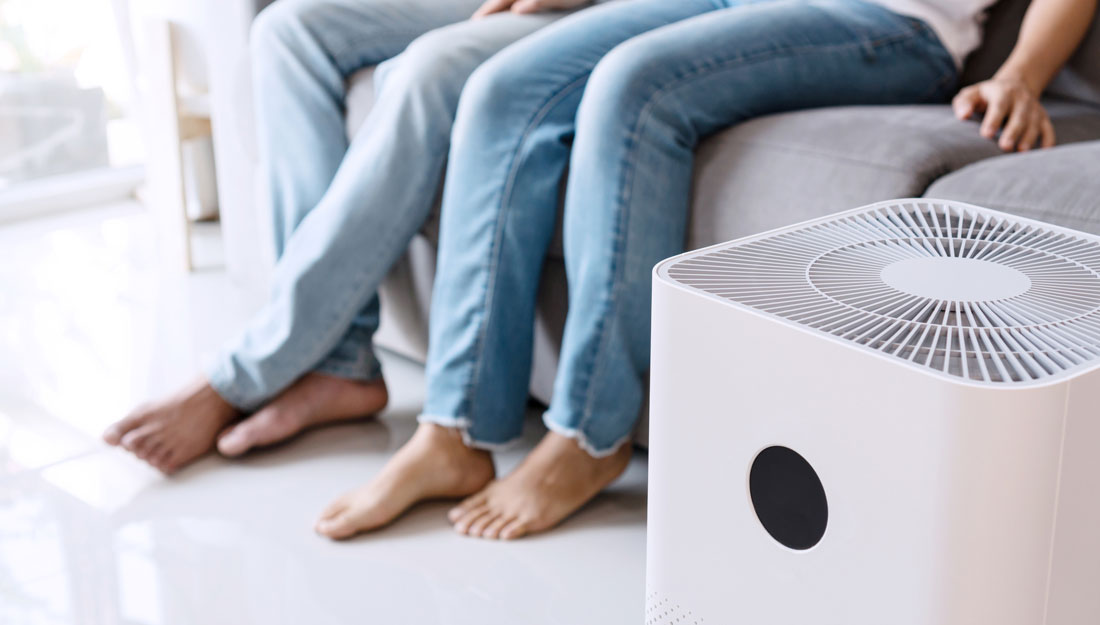- Teresa Saenz
- Health Tips, Healthy Living, Public Health, Show on VR homepage, Trending
You asked: Are air purifiers worth it?
Asthma expert explains how air purifiers with HEPA filters can improve indoor air quality

Air purifiers with HEPA filters can help improve indoor air quality, but they come with a larger price tag than traditional air filters. (Adobe Stock)
As spring settles in, so do rising levels of pollen and outdoor allergens that can make their way into your home. Although indoor air might seem cleaner than outdoor air, research shows it can be just as polluted. Dust, pet dander and fumes from cooking and cleaning can build up without proper filtration, leading to aggravated allergies, respiratory issues and poor air quality.
With all these irritants floating around, you may be considering an air purifier. But do they actually make a difference in your home’s air quality? We spoke with Genny Carrillo, MD, ScD, a professor in the Department of Environmental and Occupational Health at the Texas A&M University School of Public Health, to find out if they’re worth the investment.
What is a HEPA filter and how does it work?
HEPA stands for high-efficiency particulate air. Carrillo explained that these filters are designed to trap particulate matter (PM2.5), tiny airborne particles such as dust, pollen and pet dander. These pollutants can penetrate deep into the lungs and even enter the bloodstream, posing serious health risks such as respiratory diseases, cardiovascular issues and aggravated asthma.
Carrillo’s research evaluates the combination of asthma education with air purifiers to improve indoor air quality and health outcomes. She said air purifiers with HEPA filters are effective at reducing indoor air pollution.
“Air pollution consists of outdoor particles like dust and fumes, which can be noticeable in high-traffic areas,” Carrillo said. “Even indoors, despite a clean appearance, air pollution persists. Filters are designed to reduce both indoor air pollution and outdoor pollution which could enter our homes when we open the door.”
How does your A/C affect indoor air quality?
Heating, ventilation and air conditioning (HVAC) systems play a key role in indoor air quality, but without proper filtration, they can spread pollutants instead of reducing them, Carrillo said.
Indoor air can contain both organic and inorganic pollutants. Organic pollutants include volatile organic compounds (VOCs) from building materials, paints, adhesives, cleaners and consumer products, as well as semivolatile compounds like pesticides and fire retardants. Basic filters in most home HVAC systems, like those made of fiberglass, are not very effective at capturing these fine particles, allowing them to circulate through indoor air.
HEPA filters, on the other hand, can effectively trap small particulate matter and other airborne pollutants, improving indoor air quality, Carrillo said. However, regular maintenance, including filter replacements every three to six months, is essential to prevent dust buildup and ensure the system removes pollutants instead of spreading them.
How can you get the most out of a HEPA filter?
Although air purifiers with HEPA filters cost more than standard filters, Carrillo said their superior ability to trap fine, harmful particles makes them a valuable investment.
To get the most out of your air purifier, Carrillo recommends following the manufacturer’s maintenance schedule and making some small changes around your home to reduce pollutants.
She said the best way to reduce indoor air pollution is to eliminate avoidable sources like air fresheners and room sprays and to ventilate unavoidable pollutants from activities like cooking, cleaning and showering.
“Plug-in air fresheners, for example, release VOCs into the air, which can trigger coughing, sneezing or eye irritation, especially for those with respiratory issues,” she said.
Regularly dusting and vacuuming helps prevent allergens from building up, but Carrillo suggests avoiding feather dusters, since they can stir up dust. Instead, she recommends using a slightly damp cloth or towel to trap the dust.
Adding air monitors can provide extra protection in homes where someone has asthma or other high-risk conditions, Carrillo said. Some air quality monitors can detect pollutants such as dust, pollen, VOCs and PM2.5 to help you decide when to open windows, use air purifiers or change air filters.
The bottom line
HEPA filters are a proven way to reduce airborne pollutants, making them a solid choice for improving indoor air quality; however, they are a bit more expensive than standard air filters. HEPA filters work best as part of a broader approach to clean air—one that includes ventilation and regular maintenance alongside frequent, strategic cleaning. If you’re looking to breathe easier at home, a HEPA filter might be a worthwhile investment.
Media contact: media@tamu.edu


